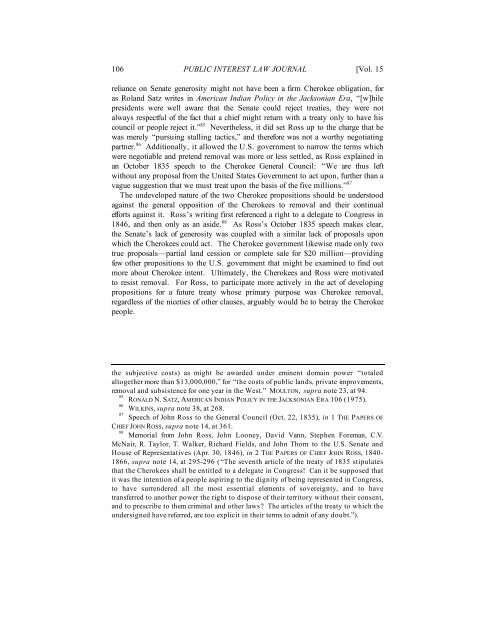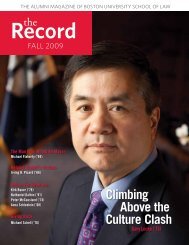the nature of representation: the cherokee right ... - Boston University
the nature of representation: the cherokee right ... - Boston University
the nature of representation: the cherokee right ... - Boston University
Create successful ePaper yourself
Turn your PDF publications into a flip-book with our unique Google optimized e-Paper software.
106 PUBLIC INTEREST LAW JOURNAL [Vol. 15<br />
reliance on Senate generosity might not have been a firm Cherokee obligation, for<br />
as Roland Satz writes in American Indian Policy in <strong>the</strong> Jacksonian Era, “[w]hile<br />
presidents were well aware that <strong>the</strong> Senate could reject treaties, <strong>the</strong>y were not<br />
always respectful <strong>of</strong> <strong>the</strong> fact that a chief might return with a treaty only to have his<br />
council or people reject it.” 85 Never<strong>the</strong>less, it did set Ross up to <strong>the</strong> charge that he<br />
was merely “pursuing stalling tactics,” and <strong>the</strong>refore was not a worthy negotiating<br />
partner. 86 Additionally, it allowed <strong>the</strong> U.S. government to narrow <strong>the</strong> terms which<br />
were negotiable and pretend removal was more or less settled, as Ross explained in<br />
an October 1835 speech to <strong>the</strong> Cherokee General Council: “We are thus left<br />
without any proposal from <strong>the</strong> United States Government to act upon, fur<strong>the</strong>r than a<br />
vague suggestion that we must treat upon <strong>the</strong> basis <strong>of</strong> <strong>the</strong> five millions.” 87<br />
The undeveloped <strong>nature</strong> <strong>of</strong> <strong>the</strong> two Cherokee propositions should be understood<br />
against <strong>the</strong> general opposition <strong>of</strong> <strong>the</strong> Cherokees to removal and <strong>the</strong>ir continual<br />
efforts against it. Ross’s writing first referenced a <strong>right</strong> to a delegate to Congress in<br />
1846, and <strong>the</strong>n only as an aside. 88 As Ross’s October 1835 speech makes clear,<br />
<strong>the</strong> Senate’s lack <strong>of</strong> generosity was coupled with a similar lack <strong>of</strong> proposals upon<br />
which <strong>the</strong> Cherokees could act. The Cherokee government likewise made only two<br />
true proposals—partial land cession or complete sale for $20 million—providing<br />
few o<strong>the</strong>r propositions to <strong>the</strong> U.S. government that might be examined to find out<br />
more about Cherokee intent. Ultimately, <strong>the</strong> Cherokees and Ross were motivated<br />
to resist removal. For Ross, to participate more actively in <strong>the</strong> act <strong>of</strong> developing<br />
propositions for a future treaty whose primary purpose was Cherokee removal,<br />
regardless <strong>of</strong> <strong>the</strong> niceties <strong>of</strong> o<strong>the</strong>r clauses, arguably would be to betray <strong>the</strong> Cherokee<br />
people.<br />
<strong>the</strong> subjective costs) as might be awarded under eminent domain power “totaled<br />
altoge<strong>the</strong>rmorethan $13,000,000,” for “<strong>the</strong> costs <strong>of</strong>public lands, privateimprovements, removal and subsistence for one year in <strong>the</strong> West.” MOULTON, supra note 23, at 94.<br />
85<br />
RONALD N. SATZ,AMERICAN INDIAN POLICY IN THE JACKSONIAN ERA 106 (1975).<br />
86<br />
WILKINS, supra note 38, at 268.<br />
87<br />
Speech <strong>of</strong> John Ross to <strong>the</strong> General Council (Oct. 22, 1835), in 1THE PAPERS OF<br />
CHIEF JOHN ROSS, supra note 14, at 361.<br />
88<br />
Memorial from John Ross, John Looney, David Vann, Stephen Foreman, C.V.<br />
McNair, R. Taylor, T. Walker, Richard Fields, and John Thorn to <strong>the</strong> U.S. Senate and<br />
House <strong>of</strong> Representatives (Apr. 30, 1846), in 2THE PAPERS OF CHIEF JOHN ROSS, 1840-<br />
1866, supra note 14, at 295-296 (“The seventh article <strong>of</strong> <strong>the</strong> treaty <strong>of</strong> 1835 stipulates<br />
that <strong>the</strong> Cherokees shall be entitled to a delegate in Congress! Can it be supposed that<br />
it was <strong>the</strong> intention <strong>of</strong> a people aspiring to <strong>the</strong> dignity <strong>of</strong> being represented in Congress,<br />
to have surrendered all <strong>the</strong> most essential elements <strong>of</strong> sovereignty, and to have<br />
transferredto ano<strong>the</strong>r power <strong>the</strong> <strong>right</strong> to dispose <strong>of</strong> <strong>the</strong>ir territorywithout <strong>the</strong>ir consent,<br />
and to prescribe to <strong>the</strong>m criminal and o<strong>the</strong>r laws? The articles <strong>of</strong> <strong>the</strong> treaty to which <strong>the</strong><br />
undersigned havereferred, are too explicitin <strong>the</strong>ir termsto admit <strong>of</strong>any doubt.”).









